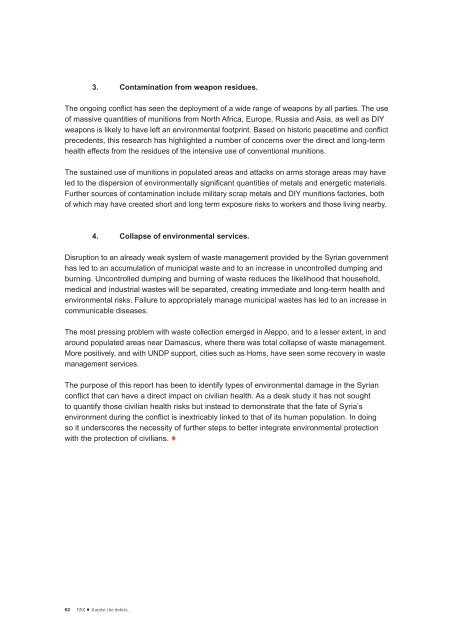Amidst the debris..
pax-report-amidst-the-debris-syria-web
pax-report-amidst-the-debris-syria-web
Create successful ePaper yourself
Turn your PDF publications into a flip-book with our unique Google optimized e-Paper software.
3. Contamination from weapon residues.<br />
The ongoing conflict has seen <strong>the</strong> deployment of a wide range of weapons by all parties. The use<br />
of massive quantities of munitions from North Africa, Europe, Russia and Asia, as well as DIY<br />
weapons is likely to have left an environmental footprint. Based on historic peacetime and conflict<br />
precedents, this research has highlighted a number of concerns over <strong>the</strong> direct and long-term<br />
health effects from <strong>the</strong> residues of <strong>the</strong> intensive use of conventional munitions.<br />
The sustained use of munitions in populated areas and attacks on arms storage areas may have<br />
led to <strong>the</strong> dispersion of environmentally significant quantities of metals and energetic materials.<br />
Fur<strong>the</strong>r sources of contamination include military scrap metals and DIY munitions factories, both<br />
of which may have created short and long term exposure risks to workers and those living nearby.<br />
4. Collapse of environmental services.<br />
Disruption to an already weak system of waste management provided by <strong>the</strong> Syrian government<br />
has led to an accumulation of municipal waste and to an increase in uncontrolled dumping and<br />
burning. Uncontrolled dumping and burning of waste reduces <strong>the</strong> likelihood that household,<br />
medical and industrial wastes will be separated, creating immediate and long-term health and<br />
environmental risks. Failure to appropriately manage municipal wastes has led to an increase in<br />
communicable diseases.<br />
The most pressing problem with waste collection emerged in Aleppo, and to a lesser extent, in and<br />
around populated areas near Damascus, where <strong>the</strong>re was total collapse of waste management.<br />
More positively, and with UNDP support, cities such as Homs, have seen some recovery in waste<br />
management services.<br />
The purpose of this report has been to identify types of environmental damage in <strong>the</strong> Syrian<br />
conflict that can have a direct impact on civilian health. As a desk study it has not sought<br />
to quantify those civilian health risks but instead to demonstrate that <strong>the</strong> fate of Syria’s<br />
environment during <strong>the</strong> conflict is inextricably linked to that of its human population. In doing<br />
so it underscores <strong>the</strong> necessity of fur<strong>the</strong>r steps to better integrate environmental protection<br />
with <strong>the</strong> protection of civilians. !<br />
62 PAX ! <strong>Amidst</strong> <strong>the</strong> <strong>debris</strong>...


